A profusion of offers, a multitude of options, prices varying from simple to double: finding WordPress hosting is a bit of an obstacle course.
If you’ve started doing some research, you’ve probably realized that it’s not easy to find the right one.
The reason we put so much thought into this question is that a good web host is crucial.

The host stores all your site’s files and database on an online server. It must therefore be trustworthy, efficient, and secure (among other things). It’s also responsible for your site’s continuous accessibility on the Internet (24/7).
In the event of recurring problems, your traffic, conversions, and online reputation can all suffer.
To help you find your way around and make the most informed choice possible, discover our selection of the best WordPress hosting providers in 2024.
By the end of this article, you’ll know which providers you can trust, and what to consider to select the best one for your needs.
Note: The features, services, and prices described in this content may have changed by the time you view the page. We endeavor to update our content as often as possible. However, please do not hesitate to let us know of any changes you feel are necessary. We’ll update our content as soon as possible to reflect market realities as transparently as possible.
This article contains affiliate links to the hosting solution Bluehost. If you choose this hosting after clicking on one of our links, WPMarmite will earn a commission. There are no additional costs for you. Affiliation enables us to finance the research and writing work of our blog editors. The income we earn also enables us to invest in new tools and offer you even higher-quality content. Please note that we only feature tools (plugins, themes, software, etc.) that we trust and recommend, either because we use them or because we’ve tested them thoroughly.
The best WordPress hosting providers in 2024
To draw up this non-exhaustive list of the best WordPress hosting companies in 2024, we have considered a number of criteria:
- The experience of the WPMarmite team with the various hosting services we’ve been able to test
- Our research and evaluations
- User opinions and feedback
- The features offered by the hosting providers
- Reliability and reputation
As a preview, here’s a quick listing of the hosting providers we consider trustworthy:
- Bluehost
- Siteground
- GoDaddy
- HostGator
- WPEngine
- Kinsta
- Hostinger
- Dreamhost
As we’ve reminded you already, a good web host is above all one that’s adapted to your needs. Keep reading for a more in-depth look at what each of these providers offer.
1) Bluehost

Bluehost is a major player in the world of WordPress hosting. Launched in 2003, the company now hosts millions of websites worldwide.
With a team of over 750 members, Bluehost is committed to providing reliable, high-performance hosting solutions, suitable for beginners and professionals alike.
Bluehost’s strengths
- Intuitive, easy-to-use interface
- Bluehost includes cPanel with its packages
- Customer service available 24/7, via email and online chat
- Optimized performance: Bluehost guarantees optimal performance thanks to advanced caching solutions, SSD storage, and Cloudfare CDN integration
- Competitive hosting rates
- Reliability: Bluehost has been recommended by WordPress.org since 2005
Bluehost rates
Bluehost offers 4 price plans:
- Basic: $2.95/month for 10 GB and use on 1 site
- Choice Plus: $5.45/month for 40 GB and use on 3 sites
- Online Store: $9.95/month for 40 GB and use on 3 sites, for online stores
- Cloud: $29.99/month for up to 225 GB of storage and use on 50 sites
Please note that these rates apply to the first year of hosting.
The more expensive the offer, the more options you have. In all cases, you’ll have access to a free domain name (the first year), an SSL certificate, a CDN, the creation of professional email addresses, and chat support (telephone support is available from the Choice Plus package).
A 30-day money-back guarantee is also available.
2) SiteGround

Founded in Bulgaria in 2004, SiteGround has established itself as a market leader, hosting over 3 million sites worldwide.
To optimize the loading speed of hosted sites, SiteGround relies on data centers on 4 continents and over 170 CDN locations worldwide.
SiteGround offers web hosting, cloud hosting, reseller hosting, and WordPress and WooCommerce hosting.
SiteGround benefits
- One-click WordPress installation
- 24/7 customer support by phone, online chat, or ticket submission
- Migration from other WordPress hosting free of charge via their migration tool or through their team, for $30/site
- Focus on performance: Static and dynamic caching enabled on all hosted sites and pre-installation of their Speed Optimizer plugin (multimedia, front-end, and WordPress environment optimizations, performance testing, and optimization tips)
- Use of Google Cloud Premium infrastructure
SiteGround rates
SiteGround offers 3 hosting packages dedicated to WordPress:
- StartUp: $2.99/month for 10 GB of space and use on 1 site
- GrowBig: $4.99/month for 20 GB of space and unlimited sites
- GoGeek: $7.99/month for 40 GB of space and unlimited sites
Please note that these rates apply to the first year of hosting.
These offers include optimizations dedicated to WordPress sites: update management, vulnerability control, firewall (WAF), etc., as well as a free domain name for the first year, an SSL certificate, and the creation of professional email addresses.
A 30-day money-back guarantee is also included.
3) GoDaddy

With more than 20 years’ experience, GoDaddy is a classic player in the world of WordPress hosting.
Founded in 1997 and based in Arizona, the company boasts a global presence and over 20 million hosted customers.
In addition to hosting, the company offers a number of other services, including an artificial intelligence–based site creation tool, site templates, a logo creation tool, and an all-in-one tool called GoDaddy Airo.
GoDaddy benefits
- Optimized hosting for WordPress
- Intuitive, easy-to-use interface. GoDaddy offers cPanel with its hosting packages.
- Customer service: Customer service is available 24/7 via email, online chat, and telephone
- Guaranteed uptime of 99.9%
- Performance: GoDaddy claims optimal performance for WordPress sites thanks to advanced caching solutions and Cloudflare CDN integration
GoDaddy pricing
On the pricing front, WP host GoDaddy offers 3 price plans dedicated to WordPress:
- Managed WordPress Basic: $10.99/month
- Managed WordPress Deluxe: $15.99/month
- Managed WordPress Ultimate: $17.99/month
Note that payment is made annually.
The more expensive the package you choose, the more features you’ll get.
In any case, you’ll get at least a free domain name, an SSL certificate, pre-installed WordPress, regular backups, an AI-based authoring tool, a firewall, and automated malware scanning and removal.
4) HostGator
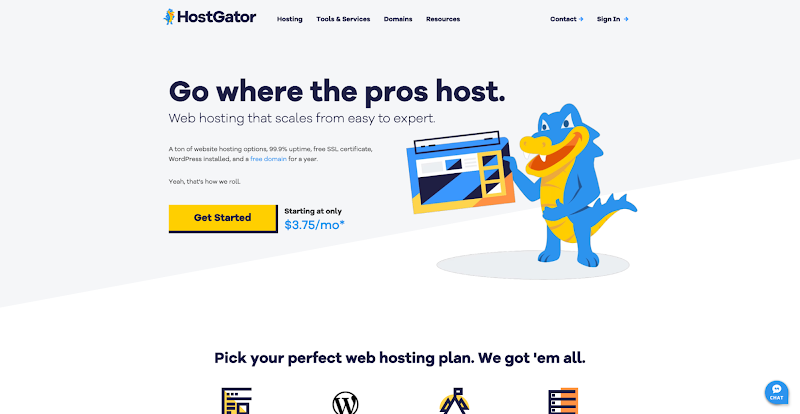
Let’s continue our list of the best WordPress hosting in 2024 with HostGator. The company, led by its trusty two-tone mascot, offers a robust solution for users of all levels.
Founded in 2002, the company has quickly established itself as one of the market leaders, with over 2 million websites hosted worldwide.
HostGator offers a range of web hosting solutions, as well as security tools, design, SEO, and SEA services.
HostGator benefits
- Intuitive interface: HostGator offers cPanel with its hosting packages
- Optimized hosting for WordPress, including daily backups, security settings, and optimized performance
- 24/7 customer support via online chat and telephone
- 99.9% server availability
- Competitive hosting rates
HostGator rates
HostGator offers a wide range of hosting packages: shared hosting, e-commerce hosting, dedicated hosting, VPS hosting, and reseller hosting.
For WordPress hosting, 3 offers are available:
- Baby Plan: $4.50/month for 20 GB and use on 2 sites
- Business Plan: $6.25/month for 40 GB and use on 3 sites
- Pro Plan: $13.95/month for 100 GB and use on 5 sites
Each offer includes at least one year’s domain name registration, one-click WordPress installation, an SSL certificate, Cloudfare CDN integration, virtually unlimited bandwidth, and a 30-day money-back guarantee.
5) WPEngine
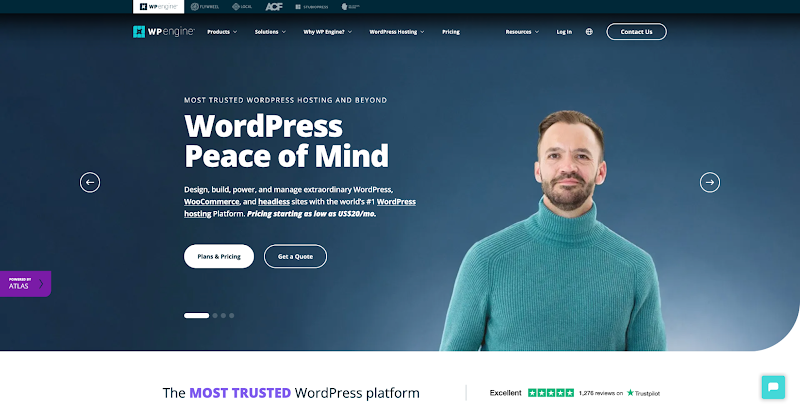
WP Engine stands out as one of the leaders in WordPress hosting, offering high-end solutions for websites of all types.
Founded in 2010, the US-based company hosts thousands of leading WordPress sites and enjoys an excellent reputation in the industry.
WP Engine focuses its hosting services on performance, security, and reliability.
WP Engine also offers a wide range of WordPress services and plugins: Advanced Custom Fields (ACF), WP Migrate, Local, etc.
WP Engine benefits
- Optimized performance: integration of EverCache, WP Engine’s in-house system, and over 200 CDN locations worldwide
- Security: Integration of advanced DDoS protection and a firewall (WAF). WP Engine is also ISO 27001 certified.
- 99.99% server uptime
- Free migration from another hosting provider to WP Engine
- 24/7 customer service via online chat, telephone, or support ticket
WP Engine prices
WP Engine offers various hosting packages dedicated to WordPress:
- Startup: From $20/month for use on 1 site
- Professional: From $40/month for use on 3 sites
- Growth: From $77/month for use on 10 sites
- Scale: From $194/month for use on 30 sites
The more expensive an offer, the greater the options for storage space, bandwidth, monthly visits, and sites.
All 3 packages include SSO and multi-factor authentication, auto-renewing SSL and SSH certificates, and site-building tools (premium themes, Genesis blocks, etc.).
A 60-day money-back guarantee is also available.
6) Kinsta
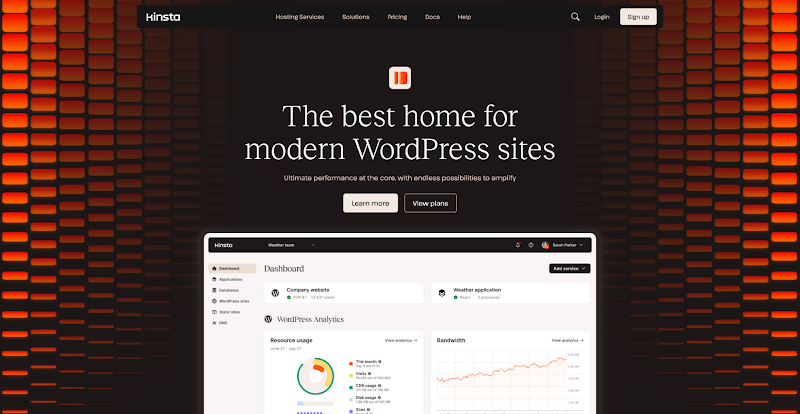
Founded in 2013, Kinsta is a Hungarian company that set out with one goal: “to create the best hosting platform in the world.”
Its major focus is on performance. As they state, they are “obsessed with fine-tuning our servers to deliver maximum speeds.”
To achieve this, Kinsta relies on 35 data centers and 260 CDN locations around the world.
Renowned for its reliability and efficiency, Kinsta is also a managed WordPress hosting service.
It is primarily aimed at technicians, developers, and companies looking for advanced performance (e.g. WooCommerce-type e-commerce stores).
Kinsta’s strengths
- High-performance data centers. Kinsta relies on Google Cloud Platform data centers at 35 sites worldwide. You can choose your own.
- Guaranteed uptime of 99.9%. Checks are performed every 2 minutes.
- 24/7 support. Kinsta promises a response time of less than 2 minutes.
- An intuitive, comprehensive MyKinsta dashboard that lets you control various aspects. For example, you can increase or decrease server resources as needed.
- Migrations from other WordPress hosting can be carried out by a dedicated team at Kinsta free of charge.
- Use of state-of-the-art technologies: Edge caching, Application Performance Monitoring (APM) tool to visualize your site’s speed problems, remote connection to your servers to launch commands securely (WP-CLI, Git, Composer), and via SFTP.
Kinsta pricing
Kinsta offers three price plans, each with a 30-day money-back guarantee:
- Starter: Grom $35/month
- Business: From $115/month
- Enterprise: From $675/month
The Starter offer includes several limits to keep in mind: 1 WordPress installation, 25,000 visits/month, 10GB storage, and 100 GB CDN.
Apart from that, each plan includes an SSL certificate, 24/7 support, DDos protection, and Cloudflare firewall integration.
7) Hostinger

Hostinger is a big machine (over 1,000 employees in 54 countries) that has been growing by leaps and bounds in recent years.
It all began in 2004, in Lithuania, when a group of young entrepreneurs created a technology startup. Hostinger was then created and launched in 2011.
Claiming over 2 million customers, Hostinger is a highly reliable, high-performance WordPress hosting solution.
It frequently innovates, for example offering a no-code, drag-and-drop WordPress site creation tool.
It also offers multiple artificial intelligence (AI)-based tools in all its web hosting plans: website creation, copywriting and SEO tools, heatmaps, etc.
Hostinger’s strengths
- Easy-to-use, easy-to-learn interface
- Hostinger offers its own in-house administration interface, called hPanel
- Responsive, efficient customer service (email and online chat), with 24/7 support
- Competitive hosting rates
- Free website migration, if required
- Optimized performance with advanced caching solutions (Object Cache, LiteSpeed Web Server) and the ability to select your server location
- 99.9% uptime guarantee
- A WordPress hosting platform for beginners and professionals alike
Hostinger pricing
Hostinger offers 3 price plans:
- Premium: $2.99/month
- Business: $3.99/month
- Cloud Startup: $9.99/month
The more expensive the package, the more options you get. In all cases, you’ll have access to a free domain name, SSL certificate, creation of professional email addresses, unlimited bandwidth, WP-CLI and SSH, and free one-click installation of WordPress.
Hostinger’s marketing offers are quite aggressive, with substantial discounts and the possibility of making multi-year commitments to further reduce the bill; however, beware: when renewing, the price does not include the original discounts.
A 30-day money-back guarantee is also available.
8) DreamHost

Founded in 1997 in California, DreamHost’s mission is to provide its users with an exceptional web hosting experience.
Since its creation, DreamHost has established itself as one of the leaders in the hosting market, with over 1.5 million sites hosted in more than 100 countries worldwide.
DreamHost offers shared, dedicated, VPS, cloud, and WordPress hosting. The company also offers WordPress themes and an in-house drag-and-drop WordPress site builder.
DreamHost benefits
- One-click WordPress installation
- Customer support available 24/7, every day of the year, via online chat or email
- 100% SSD storage to optimize site performance
- 100% uptime guaranteed
- Reliability: DreamHost is recommended by WordPress.org
DreamHost rates
DreamHost offers 3 hosting packages optimized for WordPress:
- WordPress: From $2.59/month
- DreamPress: $16.95/month
- WordPress VPS: $10.00/month
Each of these packages includes an SSL certificate, automatic updates, virtually unlimited bandwidth, and a WordPress site builder.
The more expensive the package, the more options it offers, and the better the performance and support.
So much for the presentation of the 8 best WordPress hosting providers in 2024. In the following sections, we’ll continue with our advice, recommendations, and tips for finding the right host for your needs.
What are the hosting requirements for WordPress?
As a Content Management System (CMS), WordPress needs its hosting to have certain characteristics in order to function properly.
At the time of writing, these requirements are as follows:
- PHP: The language in which WordPress is written. The server must be able to read it to display your site. Recommended PHP version: 7.4 (or higher)
- MySQL: The language of the WordPress database.
Recommended version for MySQL data: 8.0 (or higher) OR MariaDB (another database management system) version 10.4 or higher. - HTTPS support, enabling secure connection to a site (in particular through an SSL certificate).
Note: At the time of writing, the current version of PHP is 8.3. WordPress does not officially recommend this version for compatibility reasons. If your site doesn’t run on a recent version of WordPress, using a maintained version of PHP (8.1, 8.2 ,or 8.3) could potentially generate display errors and/or cause your site to crash. To find out which version to use and how to update your PHP version, check out our step-by-step tutorial.
If you see that the PHP and MySQL versions listed above are offered by a hosting company, this means that it’s possible to install WordPress with them.
And rest assured, the best WordPress hosting providers in 2024 are going to be right on the mark. 😉
If you’re using versions older than those mentioned above, WordPress also works with versions as old as PHP 7.0 and MySQL 5.0.
But, in this case, you’re exposing yourself to greater security vulnerabilities than with up-to-date versions. So try to keep up with the times to avoid errors.
What criteria should you use when choosing a WordPress hosting solution?
Your needs
The most important thing to consider before choosing your WordPress hosting is your needs.
We’re not talking about choosing the best WordPress hosting provider in 2024, but about selecting a hosting solution that meets your expectations, ambitions, and desires.
To do this, you’ll need to take a broad look at the following elements:
- Your skill level: Can you manage a server on your own (and do you want to)? Do you want to concentrate solely on your content and delegate the technical side?
- The type of site you want to create. The more content a site hosts and the more traffic it receives, the greater the resource and bandwidth requirements of the hosting provider. For example, for a large WooCommerce store with hundreds of products and heavy daily traffic (several thousand visits), shared hosting may quickly show its limits.
- The traffic you receive on a daily basis.
- Your budget: How much are you prepared to pay monthly or annually to host your website?
- The features you absolutely need. I’m thinking here of domain names, SSL certificates, storage space, bandwidth, and more advanced tools (cloning, migration, WP-CLI, etc.).
- The type of hosting you want: Shared, VPS, cloud, dedicated, or specialized.
Once all this is clear, you’ll be in a position to make an informed choice. Let’s take two examples to illustrate my point.
- If you’re a beginner blogger looking to get your site up and running, a good compromise is to opt for shared hosting to get you started.
- If you’re an e-merchant and your business and sales are largely based on your website (with a lot of traffic to your pages), it’s wiser to invest in VPS or dedicated hosting, depending on your technical skills.
The essential components of a good WordPress hosting provider
In addition to your needs, it’s important to verify the presence of certain technical features that all good hosting providers must have.
In our experience, we recommend that you consider the following before deciding on a particular provider:
- Ease of use of the interface, both in the customer area and in the administration area (cPanel type).
- Responsiveness and efficiency of support. This is very important. When you have a problem (it happens), it’s essential that you get a fast response, 24/7.
- Online server availability (uptime). If downtime is too frequent, your site will become inaccessible. In this respect, all the best WordPress hosting providers in 2024 boast rates of around 99.9%.
- Hosting server performance (speed). The faster the server, the faster your pages will load. This is important for both user experience (very important) and SEO (somewhat important). By the way, the power of the hosting (CPU, RAM) also plays a role here, so check this point carefully.
- Datacenter location. The closer the datacenter is to your visitors’ IP address, the higher the performance.
- Security. Your WordPress hosting provider must apply good security practices: analysis and detection of vulnerabilities, regular backups, server updates, etc. They must also offer you a secure password protection system. It should also offer a backup and restore system, and an SSL certificate.
- Scalability. Your needs and your site may change over time. Your hosting provider must be able to offer you a superior package at any time (more resources, more bandwidth, etc.).
- Features offered: free domain name, SSL certificate, professional email addresses, WordPress tools (themes, plugins), migration service, automated installation tool, etc.
- Disk space offered.
- Resources for finding your own answers to your questions and bottlenecks: Knowledge base, videos, tutorials, blog posts, and/or guides.
Also consider the ecological impact of your WordPress site. By choosing an ecologically responsible web host, you’re doing your part for the planet. The majority of the best WordPress hosting providers are taking action in this direction, so you should find something to suit your needs. 😉
Finally, make sure that the host you choose protects your data and that of your visitors. In principle, all good hosting companies do.
You can check this point on each host’s website, or ask their customer service department about their commitments in this area (e.g. ISO 27001 certification for information security).
Without further ado, let’s move on to a presentation of the different types of hosting you’ll find on the market. Understanding how they work will help you make the right choice.
What are the different types of hosting?
Although each hosting provider has its own specific characteristics, we can group the offers they provide into several categories.
Let’s take a look at the different types of hosting you’ll find on the Internet.
Shared hosting
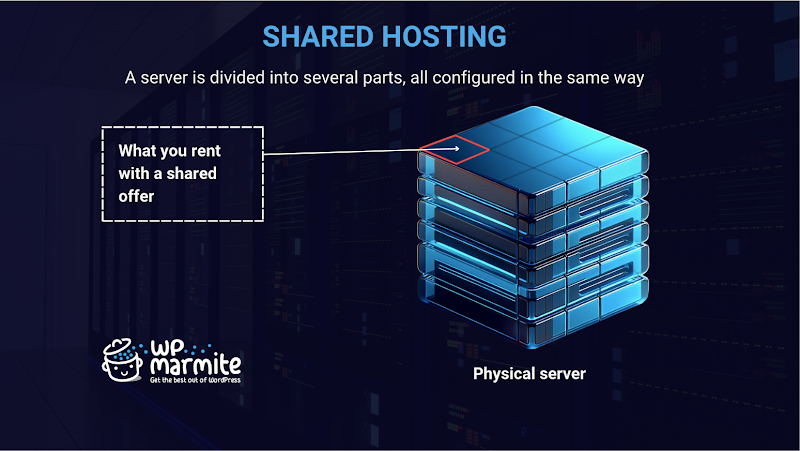
If you’re just starting out, chances are you’ll opt for this type of hosting for your WordPress site. Shared hosting offers are the most affordable and provide an adequate number of resources to get you started.
This is the type of offer I chose when I created this blog in early 2011.
In practical terms, you can think of shared hosting as low-cost housing. The space you occupy on the server (the building), and the resources you use, are shared with other sites (your neighbors).
Since several sites will be occupying the same server, resources will be limited so that each occupant can have equivalent resources.
This means that if your site becomes popular (which I hope it does!), you’ll have to opt for a higher offer, or another type of offer, so as not to cannibalize your neighbors’ resources. That’s what community living is all about. 🙂
Note: Shared hosting is recommended for freelancers, small businesses, associations, and bloggers.
VPS hosting (and the cloud)
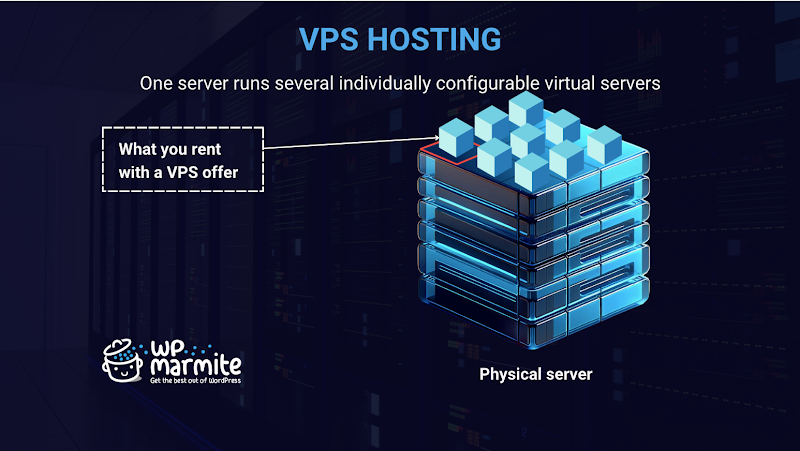
If your site is becoming so popular that you no longer have the option of upgrading to a higher-level shared offering, congratulations. You must have done your job well in promoting it!
Now it’s time to take your site to the next level with a VPS package.
VPS (Virtual Private Server) hosting is a solution that’s going to take some skill on your part.
In fact, with a VPS, you’ll need to configure your server from start to finish. In other words, you’ll need to enter command-line instructions to install and configure modules (Apache, PHP, PHPMyAdmin, etc.).
With shared WordPress hosting, everything is already configured for you. With a VPS, you have to get your hands dirty.
You’re probably wondering what the word “virtual” in VPS stands for. In practical terms, the physical server has software that allows you to create several independent servers.
Since these “sub-servers” don’t actually exist, we call them virtual.
As for the word “private,” this refers to the fact that each virtual server is independent of the others.
In other words, if a problem occurs on one of the virtual servers, it won’t affect the others.
Note: VPS hosting is also available on a “managed” basis, i.e. where the virtual server is pre-configured.
One of the advantages of VPS is that you can upgrade your offering without too much complexity. If you need more resources (disk space, computing power, RAM, etc.), simply allocate more from the management console.
So you have flexibility, a word that also applies to another type of hosting: the cloud.
I’d like to mention it briefly here, as we’re hearing more and more about it.
So let’s digress for a moment. Cloud hosting allows you to host your WP site on several dematerialized virtual servers, which generally ensures greater reliability (if one of the servers goes down, your site won’t be affected).
It also offers a great deal of flexibility: for example, you only pay for the resources and storage you consume, and you can easily add or remove them.

On the other hand, your data isn’t stored locally on a server, and you don’t have total control over it.
This can present certain security risks. And in terms of cost, it’s often more expensive than shared WordPress hosting, for example.
Note: VPS hosting is recommended for medium-sized businesses, bloggers receiving several thousand visits a day, and sites with good visibility.
Dedicated hosting
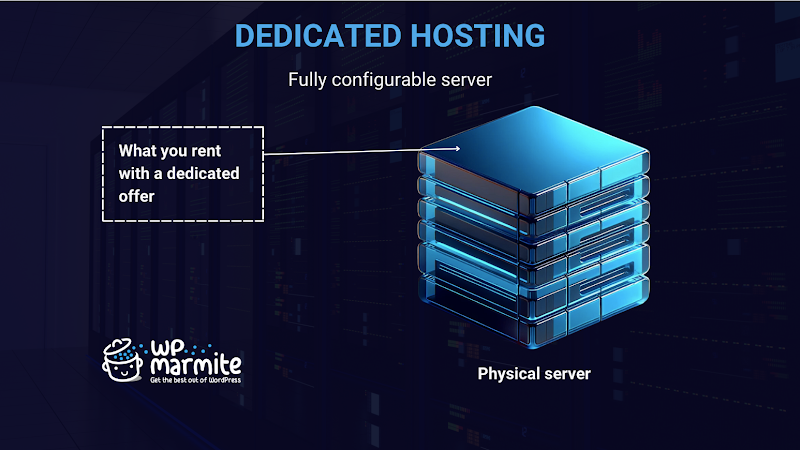
With dedicated hosting, you no longer share your server with other sites, but have a server all to yourself!
The main advantage is that you benefit from all the machine’s resources (though there are more or less powerful configurations). You can install the software you need for your site.
In short, you’re at home. 🙂
The downside is that you’ll have to manage all on your own. As with VPS hosting, you’ll need to install and configure the software on the server.
These operations require a fairly high level of expertise to ensure that your server is optimally configured. You may need to hire someone to do the job.
If you’re going to set up a dedicated server (or VPS), be extremely careful about security. These things are not to be taken lightly.
Without further ado, let’s move on to the last category of hosting providers in this article on WordPress hosting. This time, we’re going to specialize. 😉
Note: Dedicated site hosting is recommended for large corporations, highly influential bloggers, and sites receiving a very large amount of traffic.
Specialized WordPress hosting

Some hosting providers offer packages specifically designed for sites using WordPress.
In concrete terms, these offers include things that go much further than what you’d get from a standard hosting provider (regardless of the type of hosting).
Specialized WordPress hosting providers set up an infrastructure designed to make your WordPress site perform better and be more secure than with conventional hosting (by which I mean not optimized for WordPress).
Basically, you don’t have to worry about anything (except publishing interesting content on your site). But peace of mind comes at a price (and rightly so).
Specialized WordPress hosting packages generally start at between $20 and $30 per month for a single site.
Note: WordPress dedicated hosting is for bloggers and entrepreneurs who can afford it, but also for people who want to delegate the technical side of things as much as possible.
FAQ
What is WordPress hosting?
WordPress hosting, also known as managed WordPress hosting, refers to an offer from a hosting service that is specifically tailored to WordPress.
In this case, the hosting provider takes care of many technical aspects, such as backups, security, speed (performance), server maintenance, and support.
It also offers features such as migration, restoration, caching, one-click automatic installation of the CMS, and so on. So users don’t have to worry about the technical side of things.
This applies to several types of hosting, such as shared hosting or dedicated hosting, for example.
Is WordPress a web host?
WordPress is not a host. It’s a CMS (Content Management System) that lets you create any type of website (showcase site, online store, community space, blog, portfolio, etc.).
To be visible online, a WordPress site needs an online server, i.e. a dedicated space rented to you by a hosting company for the period of your choice.
What’s the best host for WordPress in 2024?
The best host for your WordPress site is the one that best meets your needs. WPMarmite recommends Bluehost. In our opinion, it offers very good value for money, and is suitable for beginners as well as more experienced profiles.
How do I host a WordPress website?
To host a WordPress website, you first need to purchase a domain name, usually free of charge.
Then, depending on your needs, select the provider best suited to your requirements. Choose the offer of your choice and create an account. Finish by installing WordPress with the hosting provider, either automatically via one-click installation, or manually.
Is it possible to host a WordPress website for free?
You can have a WordPress site hosted for free, but I wouldn’t recommend it. First of all, there’s a good chance that the host will display unwanted ads on your site.
In the event that ads aren’t displayed, free offers are generally more limited than paid offers. Servers are less powerful, functionalities are limited, and support is often nonexistent.
If you want to create a professional site that’s visible on search engines like Google, you’ll have to invest at some point. Finally, it’s also possible that your free web host will pass on your personal data to third parties, so beware.
How much does WordPress hosting cost?
Prices vary essentially according to the type of hosting (shared, dedicated, VPS, cloud, etc.), the features offered, and the reputation/experience of the provider.
Shared hosting is often the most affordable. On average, you can expect to pay between $3/month (low end) and $10/month (high end). The right price is not necessarily the cheapest or the most expensive. Above all, it’s the one that includes features and services in line with your needs and budget.
What do I do once I’ve chosen a WordPress host?
Once you’ve chosen your host, it’s time to get to work. Get started and create your WordPress site with our step-by-step guide.
First, we’ll look at choosing a domain name and hosting, then we’ll explain how to install and set up WordPress, how to add and edit content, how to customize the design, and how to add features.

